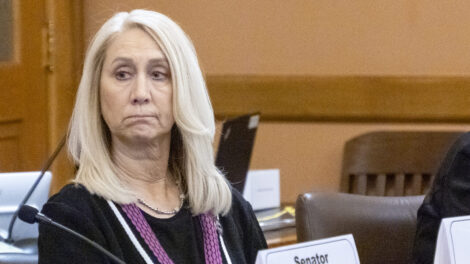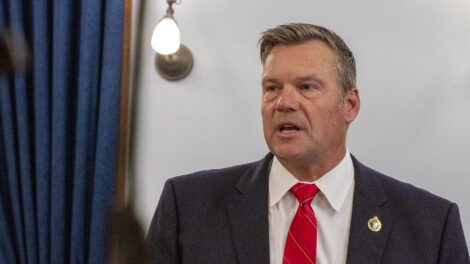In preparing for the Trump administration, Girod says higher education will have to be ‘nimble’
During Trump's first term, international enrollment declined

photo by: Chad Lawhorn/Journal-World
University of Kansas Chancellor Douglas Girod is pictured on Nov. 7, 2023.
At a time when American universities are struggling to find a message that resonates with the public, along comes a U.S. leader who is having no such problem with a message: Universities are the enemy.
That actually was the title of a 2021 speech by U.S. Sen. J.D. Vance, who, of course, is now set to become vice president of the United States next month.
It is a message that has caught the attention of higher education leaders in Kansas, but thus far hasn’t been a rallying cry for battle. If anything, it has produced some light stretching — primarily of the neck muscles, which may get much use in swiveling the head as a new administration and new pronouncements come down.
“I think we’ll keep an eye on everything,” University of Kansas Chancellor Douglas Girod told the Journal-World in a brief interview. “With both the experience previously and that there is always a bit of difference between what is said and what happens, we are trying not to overreact and trying not to commit too much one way or the other until we really know what is going to happen.
“Nimble is what we are going to try to be.”
Nimbleness has given way to sharpness for Vance with his comments on higher education and the impact it is having on American society.
“So much of what we want to do in this movement and in this country, I think, are fundamentally dependent on going through a set of very hostile institutions, specifically the universities, which control the knowledge in our society, which control what we call truth and what we call falsity, that provides research that gives credibility to some of the most ridiculous ideas that exist in our country,” Vance was reported as saying by the magazine Inside Higher Education in his 2021 speech to the National Conservatism Conference. “If any of us want to do the things that we want to do for our country, and for the people who live in it, we have to honestly and aggressively attack the universities in this country.”
In more recent comments, Vance has said he believes universities do have an important role to play in the U.S. and are “gateways to a lot of important professions and institutions in our country,” in a February interview with the magazine The European Conservative. He went on to tell the magazine that his preference is that “we should be really aggressively reforming them in a way to where they’re much more open to conservative ideas.”
In a May interview on the CBS News program Face the Nation, Vance made clear that he’s not trying to destroy universities. Rather, he thinks government should have more direct control of many of them.
“What I’m advocating for is for taxpayers to have a say in how their money is spent,” he said on the program. “Universities are part of a social contract in this country. They educate our children. They produce important intellectual property. They get a lot of money because of it. But if they’re not educating our children well, and they’re layering the next generation down in mountains of student debt, then they’re not meeting their end of the bargain. I think it’s totally reasonable to say there needs to be a political solution to that problem.”
President-elect Donald Trump also has been making comments about education in general, with some of the most headline-grabbing involving an idea to eliminate the U.S. Department of Education.
KU and other public universities in the state aren’t making plans for such a change, as the mechanism for implementing the controversial idea would face significant political hurdles, even with Republicans controlling both the House and the Senate. Unless the Senate abandons its tradition of allowing filibusters, any effort to abolish the Department of Education would require 60 votes in the Senate, which is highly unlikely given that Democrats are largely opposed to the idea.
Instead, it is the more general attitude that a growing number of Americans have about higher education that is occupying a lot of the discussion among university leaders. It was a discussion that began before the latest presidential contest, as Girod and his colleagues know that such views aren’t just confined to the Trump campaign and its rhetoric.
“Underneath all that rhetoric is some concern, and occasionally legitimate concern, about how expensive we are,” Girod said of higher education in general. “Those are concerns we hear from parents too. We believe (higher education) is absolutely an outstanding investment, and we can show the data to support that. But we are concerned that the perception isn’t there to go with it. We need to think of a different way to help people understand that.”

photo by: Chad Lawhorn/Journal-World
Blake Flanders, president and CEO of the Kansas Board of Regents, participates in a board meeting on March 17, 2022.
Blake Flanders — president and CEO of the Kansas Board of Regents, which oversees public universities in the state — said one key strategy is to help the public understand that higher education is about much more than just granting degrees.
A prime example, Flanders said, is the KU Medical Center in Kansas City, Kansas.
“You don’t have to have participated in higher education to benefit from world class cancer center care,” Flanders said.
As a research institution, Girod said KU has many activities it can tout that pushes back against the more common notions of the university only serving as a place where students come for a sometimes expensive degree. Girod said national polling shows that when the public is asked about research activities that universities conduct, the results are “actually pretty favorable.” But the public, Girod said, doesn’t always make the connection that the research wouldn’t happen without the undergraduate education that leads up to it.
“You really can’t have one without the other,” Girod said. “We have to help people understand that you have to look at the whole package.”
But if the conversation stops there, university leaders risk ignoring an elephant — perhaps wearing a GOP banner — in the room. The talking point that Republican politicians have had success with is that universities have become tremendously liberal places that are “indoctrinating” and churning out new Democratic voters.
Girod said universities do need help in combating that message.
“Part of that is we do need other voices at the table,” Girod said. “Our industry partners who hire our graduates would tell a different story. They need to be the ones that tell that story that these kids coming out and coming into their businesses are really tremendous assets.”
Girod said the business community should be a natural ally of universities because colleges play a critical role in talent development for so many industries.
“A place like us, we can import talent from other states, and no one else can really do that,” Girod said. “They desperately need us to do more of that, not less.”
Flanders said Kansas’ higher education system also probably needs to do more to highlight how it is different from many of the institutions that often garner the most national media attention. For instance, he said, universities in Kansas are seldom involved in the affirmative action or race-based admission practices that often are reported on by the national media. Kansas’ system is fundamentally different. Where Ivy League schools — and some public universities in more populous states — have to turn away college applicants due to a shortage of classroom space, that is not a problem in Kansas. The state’s public universities have plenty of space for students, thus they can simply look at more traditional entrance requirements, such as academic standing.
“I have always had questions about that when those national stories are pushed out,” Flanders said. “There are times that they are really not in alignment with our state university system and how we serve the state.”
Specific issues
Based on comments from incoming Trump administration officials — and from experience during Trump’s first term — there are some specific issues that higher education leaders are particularly watching. Here’s a look at some of them:
• International enrollment. The number of international students enrolled at KU dropped every year during the Trump administration. During the first Trump administration there were times that travel bans impacted the ability of students to arrive on campus. Girod said there is some concern that such bans or delays with student visas could have an impact again.
International Enrollment
Below are the fall enrollment totals for international students at KU for the past 10 years:
• 2015: 2,538
• 2016: 2,450
• 2017: 2,337
• 2018: 2,291
• 2019: 2,228
• 2020: 1,825
• 2021: 1,862
• 2022: 1,877
• 2023: 1,924
• 2024: 1,976
Source: University of Kansas
Flanders said public universities in Kansas will not back away from seeking international students.
“We obviously don’t want to see a drop in international students,” Flanders said. “We are going to continue to work to make sure our recruiting pipelines are open, and that they know they can have a home at Kansas universities. We are going to recruit and recruit effectively.”
• Accreditation process. While the federal government doesn’t directly accredit universities, through its federal student loan program it has the ability to determine which accreditation agencies it views as valid. Trump has called the accreditation process his “secret weapon” in reforming the U.S. university system. Girod said KU will have to be watchful of any changes in the accreditation process, but he said KU already is well underway with its major process to be re-accredited. KU will complete its key part of the process in March, well before any changes to the system could be implemented. Whether changes to the system are likely is a matter of debate. The trade journal Inside Higher Education reports that such changes are unlikely because they would require Congress to reauthorize the Higher Education Act of 1965, which hasn’t been updated for more than 15 years.
• Taxes on university endowments. Vance last year introduced legislation that would place a 35% tax on some university endowments. The bill, which did not advance out of the Senate, wouldn’t have impacted KU’s approximately $3 billion endowment held by KU Endowment. Rather, it was targeting endowments at private, secular colleges that have at least $10 billion of assets in their endowments. Regardless of its direct impact on KU, Girod said such a move to tax endowments would be “a little bit illogical,” given that individuals are given a tax break for donating to such endowments.
• Research funding. Girod said changes to how federal research dollars are allocated to universities might be one of the more likely changes to occur. Girod said those changes could be interesting, and he said there likely will be new areas of emphasis in research funding upon which KU can capitalize.
While Girod didn’t comment on it, the fact the U.S. Senate will flip from Democratic control to Republican control could be significant on the research funding front for KU. As Republicans assume control next month, Kansas’ senior lawmaker, U.S. Sen. Jerry Moran, is scheduled to become the chair of the Senate Appropriations Subcommittee on Commerce, Justice, Science, and Related Agencies. The subcommittee, along with its counterpart in the House, has budgetary oversight of all science policy in the U.S. That makes the committee a powerful one with organizations like the National Science Foundation, which awards large amounts of federal research money to universities.

photo by: Chad Lawhorn/Journal-World
U.S. Sen. Jerry Moran, left, and KU Chancellor Douglas Girod, are pictured on June 23, 2023, at a 15-year anniversary event for KU Innovation Park.





